An online biomedical science degree can help prepare you for a career in healthcare while giving you a wide knowledge base for exploring various scientific disciplines.

From the structures of cells to how infectious diseases spread, you can develop a comprehensive understanding of how the human body functions.
Editorial Listing ShortCode:
Medicine, scientific research, pharmacology, biotechnology, and biostatistics are all sectors with vast potential for the future, and a bachelors in biomedical science could be a first step on this pathway.
Online Biomedical Science Degrees
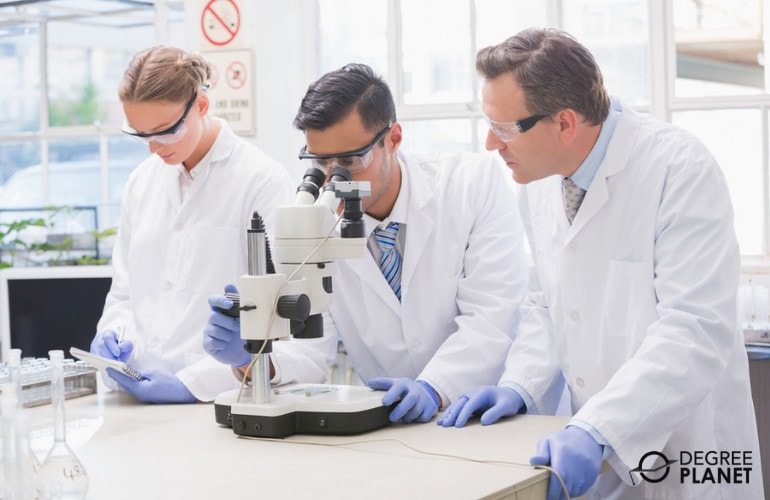
A biomedical science degree is a broad, interdisciplinary program that encompasses the study of health and disease with an emphasis on human biology. Because it’s so diverse, several fields can fall under biomedical science, such as:
- Biochemistry
- Genetics
- Biomedical engineering
- Microbiology
- Anatomy
- Physiology
- Medicine
- Molecular biology
- Infectious diseases
- Public health
- Epidemiology
When you study biomedical sciences, you’ll get an overview of several of these fields while developing core skills in science and math. These can enable you to understand the mechanisms and building blocks of biological processes.
In a biomedical sciences degree, you can study the evolution of the cell, how genes are passed down, the chemical mechanisms of organ systems in the body, and how diseases can happen and spread. This type of program generally starts out with basic biology, chemistry, and math classes before branching out into more specialized fields like anatomy and physiology or cell biology.
Editorial Listing ShortCode:
From there, students can choose electives in more specialized topics, like infectious diseases or biotechnology. Aside from theoretical knowledge, laboratory work and research are typically part of a biomedical science degree as well. Some schools may have a hybrid structure, where you’ll do laboratory activities on campus while lectures are held online.
You can also be trained to conduct your own research and to use statistics and data analysis to assess your findings. Depending on the program, you might be required to do an internship at either a clinical placement or a healthcare company. Some schools require you to work on your own research project instead under the supervision of a professor with related interests. This type of program tends to be very flexible.
As a result, you can often customize it based on your career aspirations, whether you’re planning to go to medical school or you’re more interested in becoming a scientist. Because of this, a biomedical science degree is generally considered a strategic degree for professional graduate programs in medicine, dentistry, and other healthcare fields. Graduates may also focus on research instead or join healthcare companies in corporate roles.
Biological and Biomedical Sciences Careers & Salaries
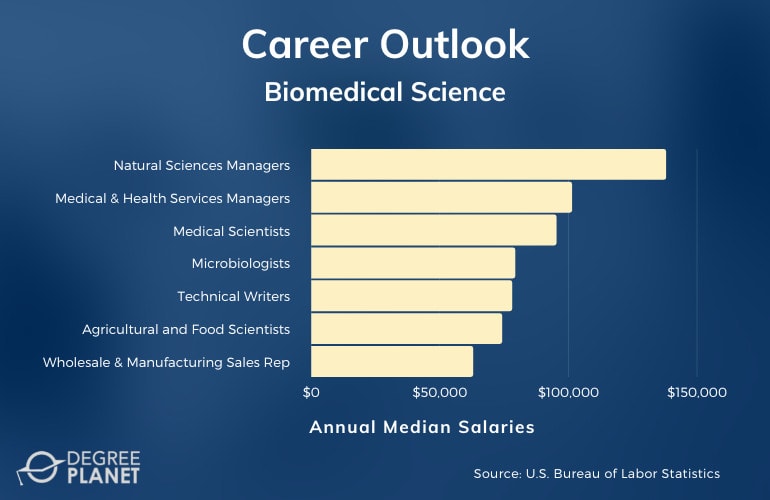
A BS in Biomedical Science can lead to rewarding careers not only in healthcare and science but also beyond. The most traditional track is to become a biomedical, clinical, or research scientist. Since biomedical science is broad, you could specialize in areas like neuroscience, cellular biology, and genetics.
Aside from this, many graduates use their degree to pursue higher studies in a health-related field. You could study biomedical sciences for your bachelor’s and then go on to medical or dentistry school. Other related graduate programs include pharmacy, veterinary medicine, and physical therapy. Alternatively, you could aim for a more research-oriented masters and PhD, such as a masters in biology online or on campus, for example.
According to the Bureau of Labor Statistics, here are the median salaries of potential jobs related to biomedical science.
| Careers | Annual Median Salaries |
| Natural Sciences Managers | $137,900 |
| Medical and Health Services Managers | $101,340 |
| Medical Scientists | $95,310 |
| Microbiologists | $79,260 |
| Technical Writers | $78,060 |
| Agricultural and Food Scientists | $74,160 |
| Wholesale and Manufacturing Sales Representatives | $62,890 |
| Forensic Science Technicians | $61,930 |
| Clinical Lab Technologists and Technicians | $57,800 |
| Biological Technicians | $48,140 |
A number of these roles require graduate degrees in healthcare or science. Many of these roles also have faster than average job growth, according to the Bureau of Labor Statistics.
Medical service managers are in high demand, as are medical scientists, clinical lab technicians, and exercise physiologists. Some graduates pursue their teaching license and enter into teaching roles, while others become science writers and editors.
Editorial Listing ShortCode:
Professionals in the field can also work in pharmaceuticals, biotechnology, and other healthcare companies and take on diverse roles, from quality assurance to project management.
Bachelor of Biomedical Science Curriculum & Courses

Biomedical science programs include general education courses along with more specialized biology and chemistry courses. Here are examples of courses you may take:
- General Biology: This course provides an overview of genetics, cell biology, and evolution, with laboratory sessions where you’ll practice techniques such as DNA isolation and dissections.
- General Chemistry: You’ll become familiar with how to use chemical notations and assess the behavior of chemicals based on their structure and mathematical problem-solving.
- Organic Chemistry: This course studies diverse, carbon-based compounds and their chemical reactions as well as how scientists create and analyze them in the laboratory.
- Biochemistry: You’ll delve deeper into how biological molecules function in the body and how chemical processes support cell functioning, with a progression from cells to more complex organs.
- Anatomy and Physiology: This course focuses on the structure and function of different organ systems in the body and how they affect each other in processes like metabolism and reproduction.
- Calculus: You’ll learn differential and integral calculus as applied to biology, with emphasis on mathematical modeling and diverse data sets from epidemiology, medicine, and other areas of biology.
- Statistics for Biology: This course introduces you to quantitative research in biology, from selecting statistical methods to doing research design and working with existing studies.
- General Microbiology: You’ll examine how microorganisms evolve, what their different characteristics and processes are, and how they impact humans.
- Genetics: This course teaches you about the structure and function of genes and chromosomes, how genes pass on traits, and practical applications of genetics, such as gene therapy.
- Cell Biology: You’ll study the various components, functions, and processes of eukaryotic cells, including how cells communicate and grow.
All of these courses are usually required, but you might be allowed to choose electives in more specialized topics, such as infectious diseases and computational biology.
Admissions Requirements

Admission requirements generally vary for each biomedical science program, but here are the standard entry criteria:
- High school transcripts. Some schools might look for a minimum GPA as well.
- SAT or ACT scores. While many schools still check your standardized test scores, a growing number of colleges no longer require them.
- Personal essay. You might be asked to explain why you’re interested in the major and what your career aspirations are.
Aside from these, schools might ask for additional requirements, such as recommendation letters.
Online Biomedical Science Degree Programs Accreditation
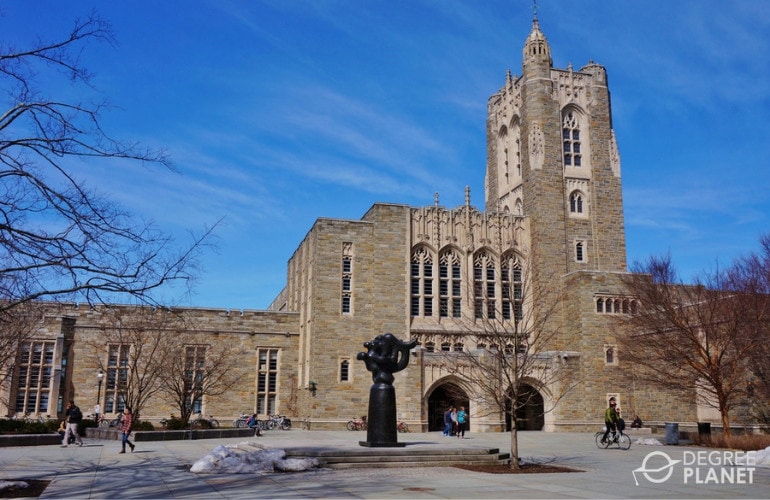
It’s beneficial to choose a regionally accredited school for your bachelors in biomedical science. Accredited schools have been reviewed extensively by accrediting organizations to ensure that they provide quality education.
Editorial Listing ShortCode:
It’s often easier to get your classes credited for graduate school if you come from an accredited college. In addition, it’s necessary to attend an accredited school to be eligible for federal financial aid. Many employers also prefer hiring candidates who hold degrees from accredited schools.
Financial Aid and Scholarships

There are many financial aid options available to biomedical science majors who qualify. Loans are among the most common aid option, with plenty of public and private sources, although these will have to be paid back with interest.
Grants and scholarships tend to be the most sought-after because they are essentially free monetary gifts that can cover part or all of your tuition. To increase your chances of winning a scholarship, you may want to apply for scholarships that are specific to your school or geared toward science students.
To apply for government-funded loans, grants, and work-study programs, you can fill out the Free Application for Federal Student Aid (FAFSA).
What Is a Biomedical Science Major?
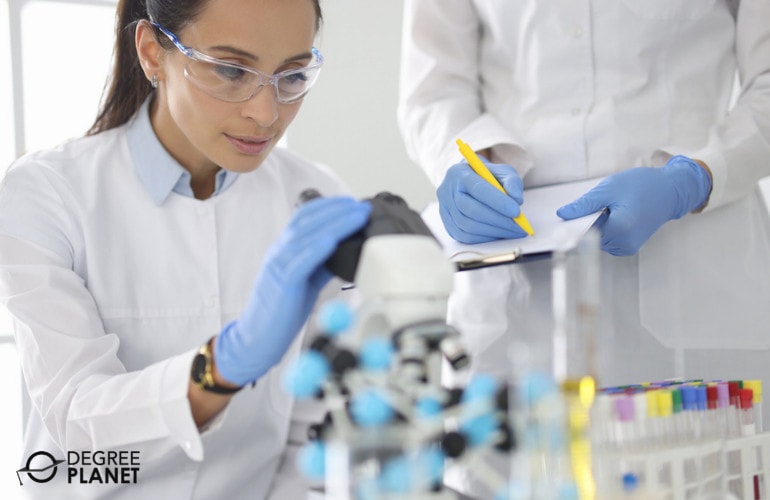
A biomedical science major is an interdisciplinary undergraduate program that studies biology, health, and disease. Because of its wide scope, studying biomedical science can be a stepping stone to healthcare graduate programs, such as medicine and dentistry, or to masters and doctoral programs in research. It can help prepare you to work in laboratories and healthcare companies too.
With a biomedical studies major, you can study various aspects of biology, including anatomy and genetics. You’ll likely conduct laboratory work as well, and you may be able to specialize in a certain track, such as virology or molecular biology.
Is Biomedical Science a Good Degree?
Yes, biomedical science is a good degree for many undergraduate students. A biomedical science degree is versatile enough that it can suit a variety of career paths. Since it exposes you to different fields, you may gain a clearer idea of what you want to do after graduation.
It teaches specialized skills that are difficult to acquire otherwise, such as research, with the option to intern at clinics and research centers. For those who want to go on to graduate school in healthcare fields, biomedical science often qualifies as a suitable bachelors degree.
What Can You Do with a Biomedical Science Degree?

A biomedical science degree can help prepare you for roles in science and healthcare as well as other sectors where scientific thinking and data analysis are important.
Biomedical science is a common bachelors degree for those who want to become doctors, veterinarians, and dentists. It can also pave the way for pursuing a specialized master’s degree, especially in research. Many graduates go on to work as biomedical scientists in laboratories, hospitals, and medical centers.
Some may join pharmaceutical and biotechnology companies instead, where they can become data analysts, regulatory specialists, and marketing professionals, among other roles.
Is Biomedical Science Hard?

Studying biomedical science requires a lot of dedication and determination. The coursework involves a great deal of problem-solving, memorization, and high-level understanding of complex scientific processes. You’ll typically study calculus and statistics too.
Editorial Listing ShortCode:
Another component of the program is the laboratory work, where you’ll aim to carry out procedures with precision and then report on your findings. With complex classes such as genetics, anatomy, and microbiology, biomedical science is not generally considered an easy major. It can be enjoyable, though, if you’re interested in the topics and keep up good study habits. You can even enroll in accredited online genetics courses if that is your interest.
How Long Does It Take to Get a Bachelor’s in Biomedical Science Degree Online?
A biomedical science bachelor’s degree online program usually consists of 120 credits. It will generally take 4 years to finish if you’re studying full-time. Still, how long it takes you to finish your degree is up to you. For example, you may be able to finish faster by pursuing an accelerated track, where you’ll take more classes and study year-round.
Some online biology degree programs also offer shorter, 8 week terms. If you’re balancing school with other work and life commitments, you may opt to study part-time, which will often extend your time to completion.
Is a Bachelor Degree in Biomedical Science Worth It?
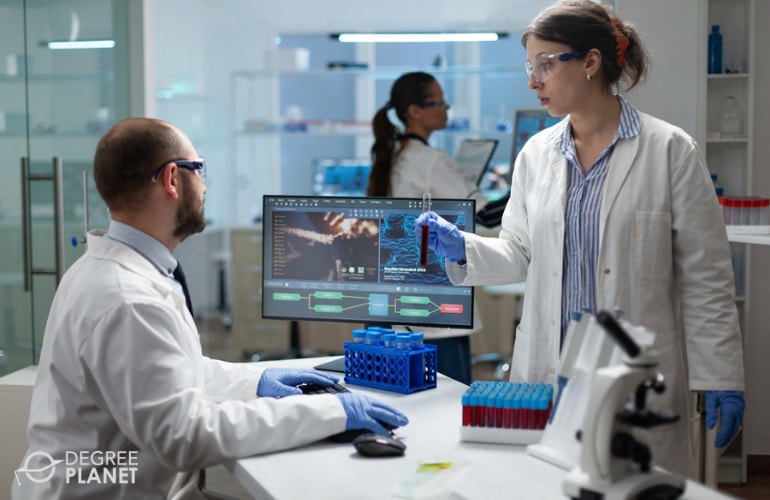
Yes, a bachelor degree in biomedical science is worth it for many students. The Bureau of Labor Statistics projects 8% job growth for scientific occupations and 16% job growth for healthcare occupations over the next ten years.
From medical service managers to technical writers and biomedical scientists, science and healthcare jobs are in demand, and these fields tend to require formal educational credentials. A degree in biomedical science can provide rigorous training for these types of roles since you can get experience with research and data analysis and build your scientific knowledge.
Editorial Listing ShortCode:
If you’re planning to go to graduate school for healthcare or science fields, then an accredited biomedical science degree fits the typical bachelor’s prerequisite.
Universities Offering Online Bachelors in Biomedical Sciences Degree Program
Methodology: The following school list is in alphabetical order. To be included, a college or university must be regionally accredited and offer degree programs online or in a hybrid format.

Arizona State University offers an online program for a Bachelor of Science in Biological Sciences with a focus in Biomedical Studies. It is designed for students interested in careers in medicine, biomedical research, or other healthcare or clinical professions. The program consists of 120 credit hours and covers topics in genetics, anatomy, physiology, and behavior.
Arizona State University is accredited by the Higher Learning Commission of the North Central Association of Colleges and Schools.

At Eastern Florida State College, students can take the Biomedical Science specialization as a track for their Bachelor of Arts, Bachelor of Science, or RN to BSN degrees. This online program features courses in broad skills, such as communication and critical thinking, as well as functional skills in research and scientific practice.
Eastern Florida State College is accredited by the Southern Association of Colleges and Schools Commission on Colleges.
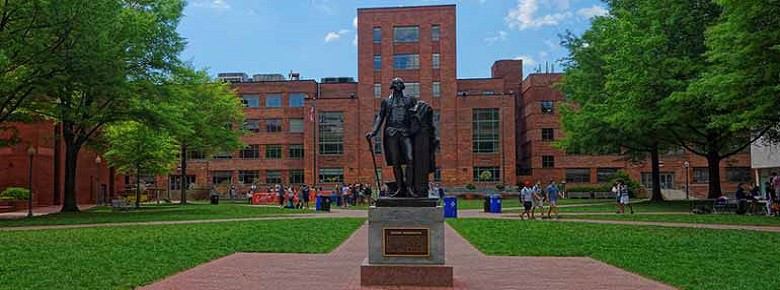
George Washington University offers an online program for a Bachelor of Science in Health Sciences with a focus in Biomedical Informatics. It is designed to prepare undergraduates for the next step in their healthcare careers. The courses and culminating internships and capstones aim to help students learn how to harness data to solve true public health crises.
The George Washington University is accredited by the Middle States Association of Colleges and Schools.
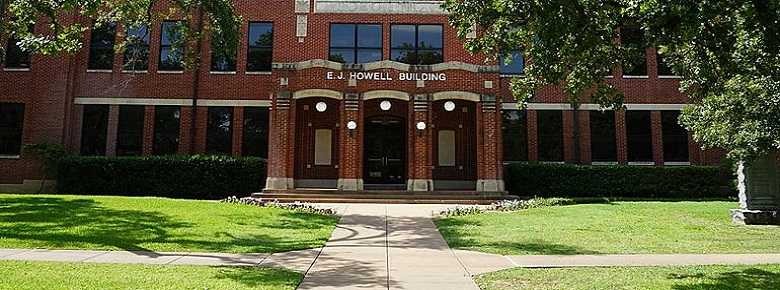
Tarleton State University’s Bachelor of Science in Biomedical Studies is designed for individuals pursuing careers in medical, dental, pharmacy, and veterinary fields. Students can attend either online or in-person, On average, most students complete the program in 4 years, including their program-specific curriculum and the university’s general education requirements.
Tarleton State University is accredited by the Southern Association of Colleges and Schools Commission on Colleges.

The University of Alaska—Fairbanks offers an online program for a Bachelor of Arts in Biology. It is designed for students with interests in high demand fields such as healthcare, biotechnology, botany, and environmental studies. The program’s core courses cover topics such as ecology, limnology, behavioral neuroscience, and cell and molecular biology.
The University of Alaska Fairbanks is accredited by the Northwest Commission on Colleges and Universities.

The University of Arizona offers a Bachelor of Science in Biology with a specialization in Biomedical Sciences. The program aims to equip students with a comprehensive understanding of core biological concepts, the scientific method, and communication within the scientific community. Students can complete the 4 year bachelor program in person at the main university campus or online.
The University of Arizona is accredited by the Higher Learning Commission.
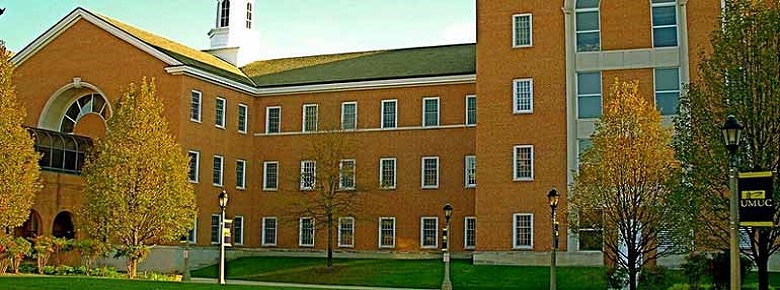
The University of Maryland Global Campus offers a Bachelor of Science in Biotechnology. The curriculum covers key concepts in molecular biology, bioinformatics, genetics, and laboratory safety. Of the 120 credits required for graduation, all courses can be completed online, and students can transfer up to 90 qualifying credits from outside institutions.
The University of Maryland Global Campus is accredited by the Middle States Commission on Higher Education.
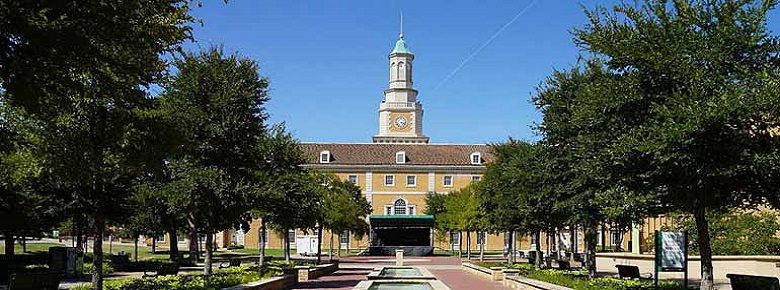
The Bachelor of Science in Biomedical Sciences at the University of North Texas is designed to prepare students for careers in research and healthcare. The program is housed online and features expert instructors well-versed in teaching online. Full-time students can typically complete their graduation requirements in 4 semesters, while part-time students usually finish in 6 semesters.
The University of North Texas is accredited by the Southern Association of Colleges and Schools Commission on Colleges.

The University of Texas Rio Grande Valley offers an online program for a Bachelor’s in Biomedical Studies. It is designed for students interested in healthcare professions, such as medicine, dentistry, pharmacy, physical therapy, and veterinary. The curriculum is intended to better-prepare students for pre-professional healthcare admissions exams, like the MCAT, GRE, PCAT, DAT, and OAT.
The University of Texas Rio Grande Valley is accredited by the Southern Association of Colleges and Schools Commission on Colleges.

The Bachelor of Science in Biomedical Sciences at the University of Wisconsin—Milwaukee features several concentrations. Options include Public Health Microbiology, Radiologic Technology, and Diagnostic Imaging. The program consists of a minimum of 120 credits that can be completed fully online or in-person.
UWM is accredited by the Higher Learning Commission.
Getting Your Bachelors in Biomedical Sciences Online

Earning a biomedical science online degree can help you develop the skills and knowledge needed to get involved in science and healthcare.
Studying biomedical science can help you gain a broad understanding of different healthcare disciplines and train you to think critically and rigorously. This foundational degree could be beneficial whether you’re interested in developing medicine, working as a veterinarian, or contributing to the next innovation in biotechnology.
There are many online biomedical science programs available from accredited schools, and you can start exploring your options today to find the educational track that fits your aspirations.

